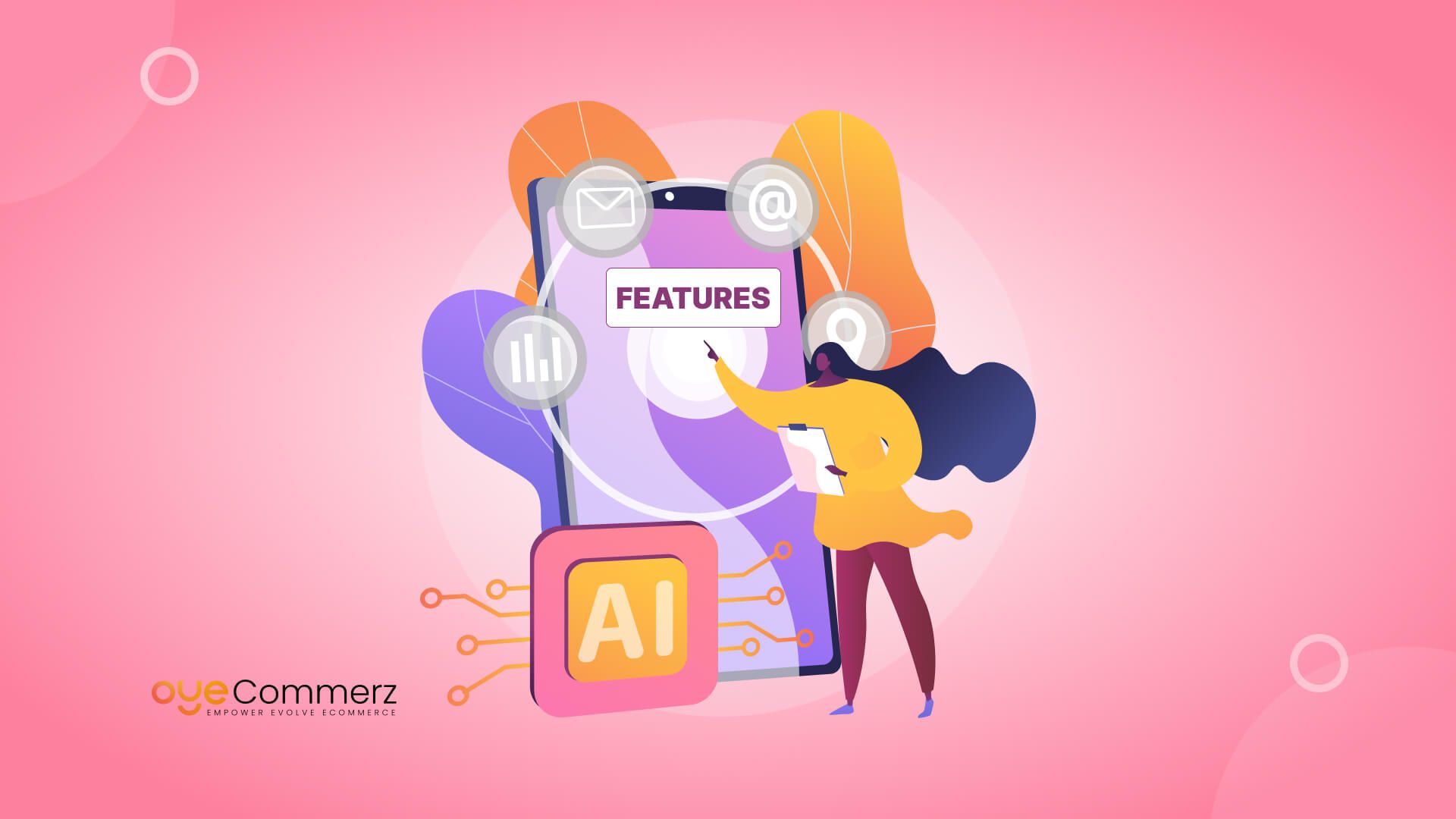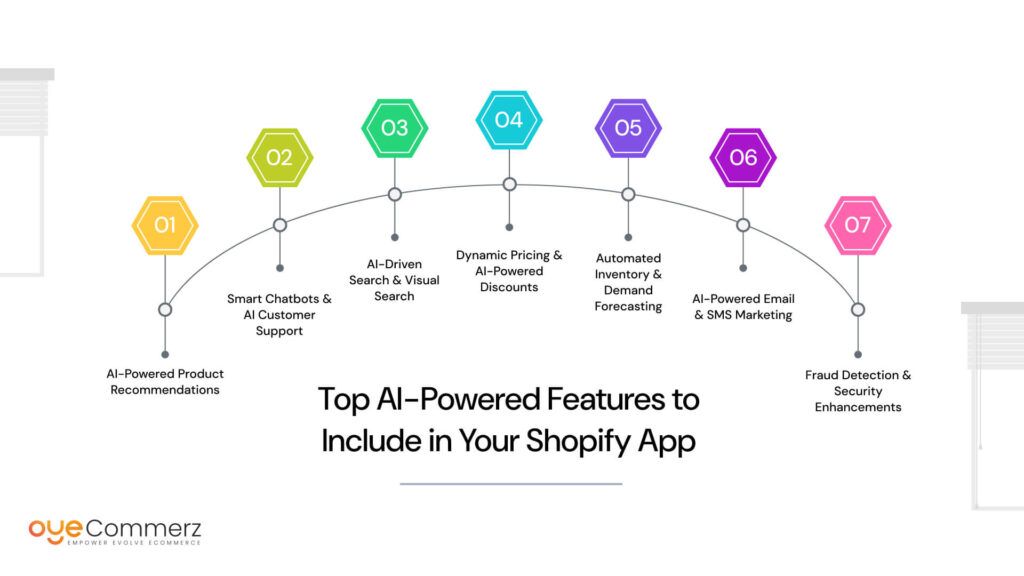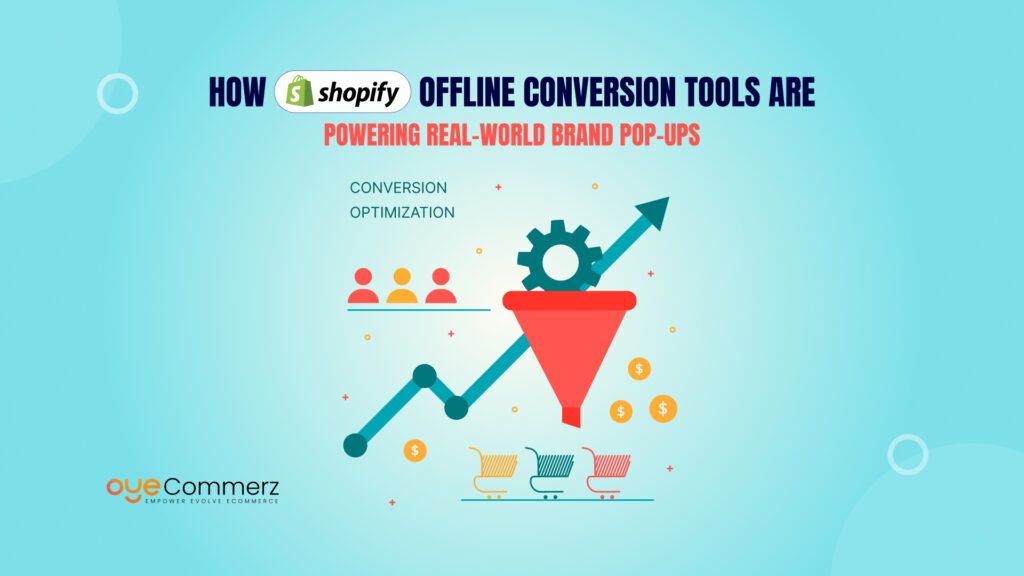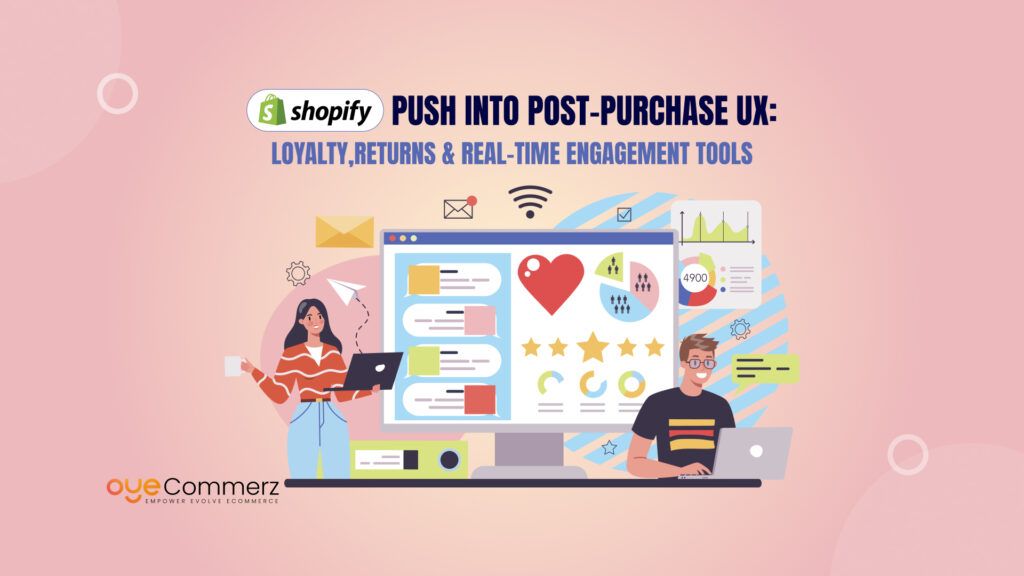Are you making the most of AI to boost your Shopify store’s performance?
With online shopping becoming more competitive than ever, standing out requires more than just great products; it demands smart technology. AI-powered Shopify apps are reshaping the way businesses engage with customers, optimize operations, and increase sales.
From intelligent product recommendations to automated customer support, AI enables Shopify merchants to work smarter, not harder. It enhances personalization, streamlines decision-making, and unlocks new opportunities for revenue growth.
In this blog, we’ll explore the top AI-powered features you should include in your Shopify app to stay ahead of the competition and create a seamless shopping experience.
Table of Contents
ToggleWhy AI is Essential for Shopify Apps
AI adoption in eCommerce is accelerating at an unprecedented rate. According to industry reports, AI-powered solutions in online retail are expected to grow significantly, with businesses using AI to improve customer engagement, automate marketing, and enhance product discovery.
Shopify, being a leading eCommerce platform, has embraced AI through its ecosystem of powerful apps and integrations. AI is now used in various aspects of Shopify store management, including:
- Personalized product recommendations (increasing conversions and AOV)
- AI-powered chatbots (handling customer queries instantly)
- Automated marketing campaigns (sending tailored emails and promotions)
- Smart inventory management (predicting demand and preventing stockouts)
- AI-driven pricing strategies (optimizing pricing based on competition and demand)
As competition grows, Shopify merchants who integrate AI into their stores gain a significant edge over those who rely solely on traditional eCommerce methods.
How AI Helps Shopify Merchants Boost Sales, Optimize Operations & Improve Customer Experience
AI-powered Shopify apps provide tangible benefits that directly impact sales, efficiency, and customer satisfaction. Here’s how:
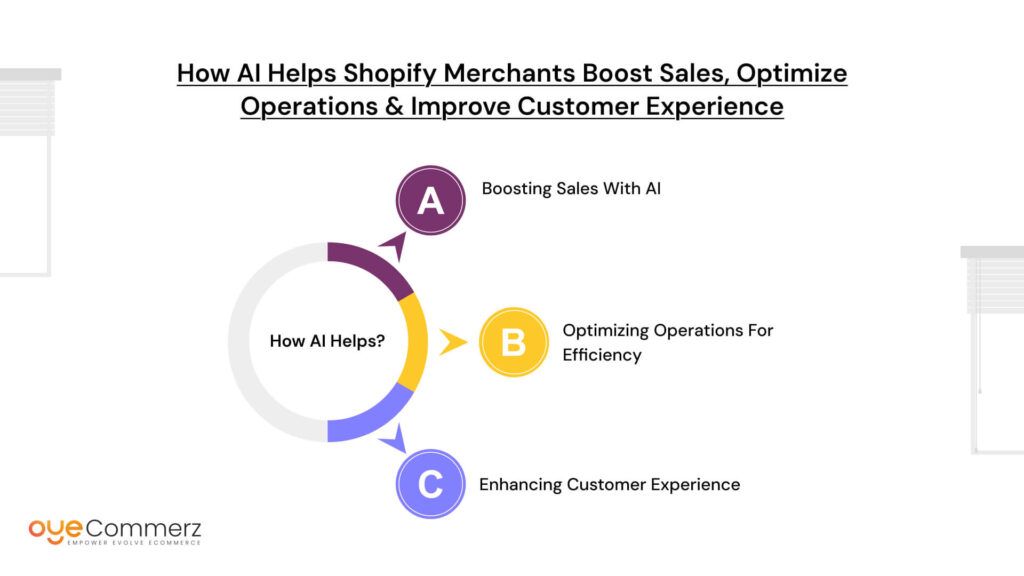
1. Boosting Sales with AI
AI-driven recommendations and dynamic pricing strategies help merchants maximize revenue.
- Personalized shopping experiences: AI suggests products based on user behavior, increasing conversions.
- Dynamic pricing optimization: AI adjusts prices in real-time to stay competitive.
- Upselling & cross-selling automation: AI recommends complementary products to increase AOV (Average Order Value).
2. Optimizing Operations for Efficiency
AI-powered automation streamlines key business processes, reducing manual work and improving efficiency.
- Smart inventory management: Predicts demand, prevents overstocking, and reduces waste.
- Automated order fulfillment: AI-powered apps manage order processing and logistics more efficiently.
- AI-powered fraud detection: Identifies suspicious transactions and minimizes chargebacks.
3. Enhancing Customer Experience
AI improves the overall shopping experience by making interactions smoother and more personalized.
- AI chatbots & virtual assistants: Provide 24/7 support, answer FAQs, and handle inquiries.
- Voice search & AI-powered search engines: Help customers find products faster.
- Sentiment analysis & customer insights: AI analyzes reviews and feedback to improve products and services.
Top AI-Powered Features to Include in Your Shopify App
1. AI-Powered Product Recommendations
AI-driven product recommendations analyze customer behavior, browsing history, and purchase patterns to suggest relevant products. By leveraging machine learning, AI identifies what customers are likely to buy next, making shopping more personalized and engaging.
How It Works
- AI tracks user interactions such as clicks, views, and purchases to understand preferences.
- It uses predictive analytics to display tailored product suggestions.
- Recommendations are updated in real time based on user actions.
Benefits
- Increases Average Order Value (AOV): Customers are more likely to purchase additional items when they see relevant add-ons.
- Boosts Conversion Rates: Personalized recommendations make it easier for shoppers to find what they need, leading to more sales.
- Enhances User Experience: AI removes the guesswork by offering a seamless, intuitive shopping journey.
Example
Amazon’s “Customers Also Bought” and “Frequently Bought Together” sections drive significant sales by suggesting complementary products. Shopify merchants can implement similar AI-powered recommendations using apps like LimeSpot, ReConvert, or Bold Upsell to maximize revenue.
2. Smart Chatbots & AI Customer Support
AI-driven chatbots automate customer support by instantly handling inquiries, reducing response times, and improving customer satisfaction. These chatbots use natural language processing (NLP) to understand and respond to customer questions efficiently.
How AI Chatbots Help
- Handle FAQs: Instantly answer common questions about products, policies, and services.
- Order Tracking: Provide real-time order status updates without human intervention.
- Personalized Assistance: Offer tailored product recommendations and support based on user behavior.
Benefits
- Reduces customer service workload by automating repetitive tasks.
- Enhances user experience with 24/7 instant support.
- Increases conversions by guiding customers through the buying process.
Example
Shopify chatbots like Gorgias and Tidio help merchants automate customer interactions, improve response times, and drive sales by offering proactive support.
3. AI-Driven Search & Visual Search
AI-powered search enhances accuracy and speed by understanding customer queries beyond simple keywords. Using machine learning and natural language processing, AI search engines deliver highly relevant results, improving product discovery and shopping experience.
How AI Search Works
- Predictive Search: Suggests relevant products as users type.
- Semantic Search: Understands intent rather than just matching keywords.
- Personalized Results: Adapts search results based on user behavior.
Visual Search
- Allows customers to upload an image to find similar products.
- Uses AI to analyze shapes, colors, and patterns for precise matching.
- Helps shoppers discover products even if they don’t know the exact name.
Example
AI-powered search engines like Algolia and Searchanise enhance Shopify stores by delivering faster, smarter, and more intuitive search experiences.
4. Dynamic Pricing & AI-Powered Discounts
AI-driven pricing strategies help Shopify merchants maximize revenue by adjusting prices in real time based on demand, competitor pricing, and customer behavior. This ensures competitive pricing while optimizing profit margins.
How AI Pricing Works
- Real-Time Price Adjustments: AI analyzes market trends and competitor pricing to set optimal prices.
- User Behavior-Based Discounts: Offers personalized discounts based on browsing and purchase history.
- Demand-Based Pricing: Increases or decreases prices dynamically depending on product demand.
Benefits
- Maximizes sales by staying competitive in the market.
- Increases conversions with personalized, data-driven discount strategies.
- Improves profit margins by optimizing pricing for different customer segments.
Example
AI-based pricing tools like Prisync help Shopify merchants automate price tracking and adjustments, ensuring they remain competitive while increasing revenue.
5. Automated Inventory & Demand Forecasting
AI-powered inventory management helps Shopify merchants predict demand, optimize stock levels, and prevent stockouts or overstocking. By analyzing historical sales data, market trends, and customer behavior, AI enables smarter inventory decisions.
How AI Forecasting Works
- Predicts Demand: AI analyzes past sales trends and seasonal patterns to forecast future demand.
- Optimizes Stock Levels: Ensures the right amount of inventory is available to meet demand.
- Prevents Overstocking & Stockouts: Reduces excess stock while preventing lost sales due to shortages.
Benefits
- Improves cash flow by minimizing unnecessary inventory costs.
- Enhances supply chain efficiency with accurate demand predictions.
- Reduces waste and maximizes profitability.
Example
AI inventory tools like Inventory Planner help Shopify merchants automate demand forecasting, optimize stock levels, and streamline supply chain management.
6. AI-Powered Email & SMS Marketing
AI-driven email and SMS marketing enhances customer engagement by delivering personalized messages at the right time. By analyzing customer behavior, AI automates campaigns, optimizes content, and improves conversion rates.
How AI Marketing Works
- Personalized Campaigns: AI tailors emails and SMS messages based on user preferences, past purchases, and browsing behavior.
- Behavioral Triggers: Sends automated messages when a customer abandons a cart, makes a purchase, or shows interest in a product.
- AI-Powered Segmentation: Groups customers based on purchase history, engagement levels, and demographics for more targeted marketing.
Benefits
- Increases open and click-through rates with highly relevant content.
- Boosts sales by sending timely, data-driven promotions.
- Reduces manual effort with automated, AI-optimized messaging.
Example
AI-powered tools like Klaviyo use machine learning to automate email and SMS marketing, ensuring Shopify merchants engage customers effectively and drive higher revenue.
7. Fraud Detection & Security Enhancements
AI-powered fraud detection helps Shopify merchants identify suspicious transactions, reduce chargebacks, and protect customer data. By analyzing patterns and anomalies, AI can detect fraudulent activities in real time.
How AI Fraud Detection Works
- Transaction Monitoring: AI analyzes purchasing behavior to detect unusual activity.
- Risk Scoring: Assigns risk scores to transactions based on factors like location, IP address, and purchase history.
- Automated Fraud Prevention: Flags or blocks high-risk transactions before they are processed.
Benefits
- Reduces financial losses from fraudulent transactions and chargebacks.
- Improves store security by detecting potential threats early.
- Enhances customer trust with a safer shopping experience.
Example
Shopify’s built-in fraud detection system automatically flags suspicious orders, while third-party AI tools like Signifyd provide advanced fraud prevention for Shopify merchants.
How to Implement AI in Your Shopify App
Integrating AI into a Shopify app can significantly enhance automation, personalization, and data-driven decision-making. However, successful implementation requires careful planning, the right technology stack, and adherence to best practices. This guide covers key steps for building an AI-powered Shopify app, from selecting the right tools to optimizing machine learning models.
1. Choosing the Right AI Tools and APIs
Selecting the appropriate AI tools and APIs is the first step in building a Shopify app with intelligent features. Shopify provides extensive support for third-party AI integrations, allowing developers to enhance store functionality with minimal friction.
Key Considerations When Choosing AI Tools:
- Functionality Needs: Determine what AI-powered features your app requires, such as chatbots, product recommendations, fraud detection, or dynamic pricing.
- Shopify Compatibility: Ensure the AI tools you choose integrate seamlessly with Shopify’s API and infrastructure.
- Scalability: Select AI solutions that can handle increasing data loads as the business grows.
- Ease of Implementation: Consider whether the AI solution offers pre-built APIs or if it requires custom development.
Popular AI Tools and APIs for Shopify Apps
AI Feature | Recommended Tools & APIs |
Chatbots & Customer Support | Gorgias, Tidio, ChatGPT API |
Product Recommendations | LimeSpot, Rebuy, Algolia |
AI Search & Visual Search | Algolia, Searchanise, Google Vision API |
Dynamic Pricing & Discounts | Prisync, Omnia Retail |
Inventory Forecasting | Inventory Planner, Skubana |
Email & SMS Marketing | Klaviyo, Omnisend |
Fraud Detection & Security | Shopify’s built-in fraud analysis, Signifyd, Riskified |
Using Shopify’s own AI features and third-party APIs allows developers to integrate AI quickly without building models from scratch.
2. Leveraging Machine Learning Models for Smarter Decision-Making
Machine learning (ML) is the core of AI-powered apps. By training models on real data, AI can make intelligent decisions that improve over time.
How Machine Learning Enhances Shopify Apps:
- Personalization: AI models analyze user behavior to recommend products tailored to each customer.
- Automation: AI automates tasks like email marketing, pricing adjustments, and chatbot responses.
- Fraud Detection: Machine learning detects unusual patterns in transactions to flag fraudulent activity.
- Predictive Analytics: AI forecasts demand trends, helping businesses manage inventory efficiently.
Steps to Implement Machine Learning in a Shopify App
- Define Your AI Use Case: Decide whether your app will use AI for recommendations, search, pricing, or automation.
- Collect & Preprocess Data: Gather customer behavior data, purchase history, and interactions to train AI models.
- Train AI Models: Use supervised or unsupervised learning techniques to teach the model how to make predictions.
- Integrate AI with Shopify API: Connect AI models to Shopify’s backend for real-time decision-making.
- Continuously Optimize: Update machine learning models with new data to improve accuracy over time.
Popular machine learning frameworks for Shopify app development include TensorFlow, PyTorch, and Scikit-learn for training models, while Google AI and OpenAI offer powerful pre-built AI models.
3. Best Practices for AI-Powered App Development
To ensure a smooth AI integration, developers must follow best practices that enhance performance, security, and user experience.
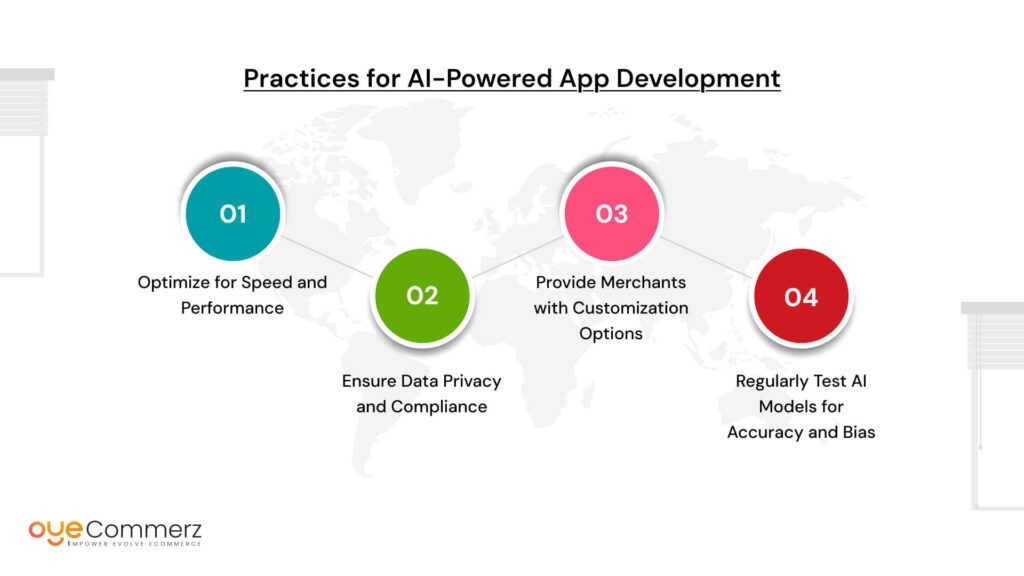
1. Optimize for Speed and Performance
- AI processing can slow down Shopify stores if not optimized properly.
- Use cloud-based AI services to reduce on-site processing load.
- Implement caching techniques for frequently used AI results (e.g., saved recommendations).
2. Ensure Data Privacy and Compliance
- AI apps handle sensitive customer data, so compliance with privacy regulations like GDPR, CCPA, and PCI DSS is critical.
- Encrypt stored data and use tokenization to secure transactions.
- Allow users to opt out of AI-powered tracking and personalization.
3. Provide Merchants with Customization Options
- Not all Shopify merchants have the same AI needs.
- Enable adjustable settings for AI features, such as discount thresholds, chatbot responses, and recommendation algorithms.
- Offer a user-friendly dashboard where merchants can manage AI preferences.
4. Regularly Test AI Models for Accuracy and Bias
- AI models can become outdated or develop biases over time.
- Conduct A/B testing to compare AI-driven recommendations and pricing strategies with manual ones.
- Use machine learning evaluation metrics like precision, recall, and F1-score to measure AI effectiveness.
Integrating AI into a Shopify app is no longer a luxury; it’s a necessity for creating smarter, more efficient eCommerce solutions. By selecting the right AI tools, leveraging machine learning, and following best practices, developers can build powerful apps that help Shopify merchants increase sales, improve customer experience, and automate operations.
For Shopify merchants, AI-powered apps provide a competitive edge, ensuring they stay ahead in an increasingly AI-driven market.
Get Started with AI-Powered Shopify Apps Today
Unlock the full potential of AI for your Shopify store with Oyecommerz. Whether you need intelligent product recommendations, automated customer support, or data-driven pricing, our expert team specializes in building custom AI-powered Shopify apps tailored to your business needs. Stay ahead of the competition with smarter automation and personalized shopping experiences.
Ready to integrate AI into your Shopify app? Contact Oyecommerz today and let’s build a future-proof solution for your eCommerce success!
Contact to Migrate your Site to Shopify Now
Conclusion
AI is transforming Shopify app development by enabling smarter automation, personalization, and data-driven decision-making. Key AI features such as product recommendations, chatbots, dynamic pricing, and fraud detection help merchants boost sales, improve customer experience, and optimize operations. As AI technology continues to evolve, its role in eCommerce will become even more crucial, offering advanced solutions for predictive analytics, voice commerce, and hyper-personalization. Now is the time to integrate AI into your Shopify app to stay competitive. Whether you’re a developer or a merchant, leveraging AI-driven solutions can drive growth and efficiency. If you need expert guidance, consult professionals to build a powerful AI-powered Shopify app.

